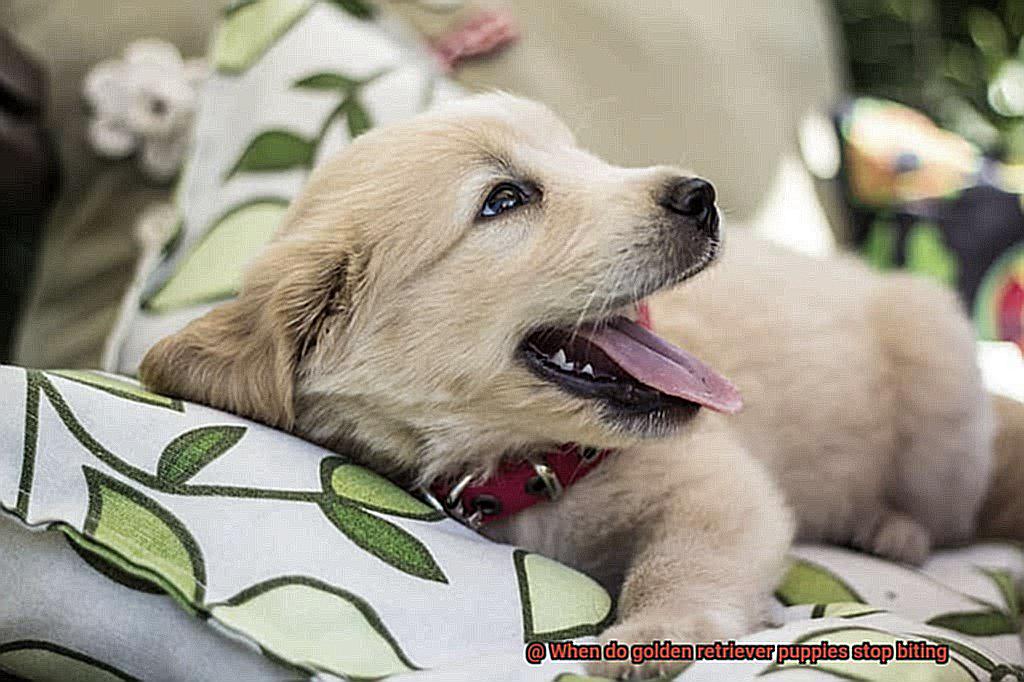Are you the lucky owner of a Golden Retriever pup? If so, you’re probably well aware of their boundless energy and infectious enthusiasm. However, one behavior that may not be as charming is their tendency to nip and bite. While it may seem harmless at first, those tiny razor-sharp teeth can leave a lasting impression. So, when exactly do Golden Retriever puppies stop biting?
Fortunately, biting is a natural part of puppyhood and can be easily corrected with proper training. Consistency is key in teaching your furry friend not to bite. The first step is to ensure they have plenty of chew toys available to them. This will give them an acceptable outlet for their chomping urges while also promoting healthy teeth.
Training your Golden Retriever pup not to bite also involves making it clear that this behavior is unacceptable. Whenever they nip or bite, respond firmly with a “no” and remove yourself from the situation. This shows them that biting won’t get them the attention they crave.
So, when can you expect your furball to stop chomping down on everything in sight? Typically, puppies will stop biting around four to six months old but every pup is unique and may require more time. With patience and consistent training, your pup will learn that biting isn’t acceptable behavior – leading to a happy life free from painful nips.
What is Biting Behavior in Golden Retriever Puppies?
Contents
But don’t worry – biting is a natural behavior for puppies, as they explore the world around them through their mouths. However, it can become problematic if the biting is too aggressive or frequent.
Biting behavior in golden retriever puppies can be categorized into two types: playful biting and aggressive biting. Playful biting is usually harmless and happens during playtime or when the puppy is excited. On the other hand, aggressive biting can be dangerous, often accompanied by growling, lunging, and snapping. If your puppy displays this type of behavior, it’s crucial to seek immediate attention from a professional.
It’s important to understand that biting behavior in golden retriever puppies is not necessarily a sign of aggression. Puppies use their mouths to explore the world around them and to learn about their environment. They also bite as a way to communicate with their littermates and other dogs.
Golden retriever puppies typically stop biting around four to six months of age because they begin teething during this time, causing discomfort in their gums. Consequently, puppies often use biting as a way to relieve this discomfort. As the puppy’s adult teeth come in, they will lose their baby teeth, which can also contribute to a decrease in biting behavior. Additionally, as the puppy grows and becomes more socialized, they will learn appropriate behaviors and bite inhibition.
However, each puppy is unique, and some may stop biting earlier or later than others. This is why consistent training and positive reinforcement are essential in reducing biting behavior. Provide your puppy with appropriate chew toys and redirect them when they attempt to bite or nip at people or objects. Socialization with other dogs and people can also help teach bite inhibition and appropriate behavior.

When Do Golden Retriever Puppies Stop Biting?
Golden Retriever puppies are known for their playful and energetic personalities. Their enthusiasm and curiosity often lead to biting, which can be a concern for new puppy owners. But when do Golden Retriever puppies stop biting? The truth is that it varies from puppy to puppy. Some may stop as early as four months old, while others may continue until they are over a year old. However, there are a few things you can do to help your little one learn appropriate behavior and eventually stop biting.
First and foremost, socialization is crucial. Exposing your pup to different people, dogs, and environments from an early age helps them understand what behavior is acceptable and what isn’t. This can help reduce biting behavior as they learn how to interact appropriately with others.
Training is also key. Teaching your pup basic commands like “sit,” “stay,” and “drop it” gives them direction and helps redirect their attention away from biting. Providing chew toys and other items they can safely bite on also helps redirect their biting behavior.
It’s important to remember that stopping biting behavior takes time and patience. Consistent training and positive reinforcement are essential in helping your Golden Retriever puppy learn appropriate behaviors. With love, attention, and proper training, your little one will eventually grow out of their biting phase and become a well-behaved adult dog.
Factors That Affect When Puppies Stop Biting
As with everything in life, there isn’t a fixed timeline for when puppies stop biting, but there are factors that affect when this behavior will cease.
The first factor is genetics. Some dogs may naturally have a more gentle disposition and may not be as prone to biting or nipping. However, if the puppy’s parents had a tendency to bite, the puppy may also display those behaviors. It’s worth noting that this doesn’t mean certain breeds are more likely to bite than others – any dog can exhibit biting behavior.
The second factor is socialization. Proper socialization plays a crucial role in helping puppies learn appropriate behaviors and reducing their tendency to bite. Socialization involves exposing your puppy to different people, animals, and situations in a positive and controlled manner. This helps them understand what behaviors are acceptable and what aren’t.
The third factor is training and discipline methods. Physical punishment or harsh disciplinary techniques can lead to fear or aggression in puppies, which may cause them to continue biting as they grow older. Positive reinforcement training techniques, on the other hand, can help teach your puppy appropriate behaviors and encourage them to stop biting. For example, rewarding your puppy with treats or praise when they exhibit good behavior reinforces positive associations.
Lastly, age is a factor in when puppies stop biting. Most puppies begin teething at around 3-4 months of age and will start to lose their baby teeth around 4-6 months of age. As their adult teeth come in, their urge to bite and chew may decrease as their mouths become less sensitive.
Tips for Reducing Biting Behavior
Golden retriever puppies are undoubtedly the cutest little balls of fur, but their biting behavior can quickly turn into a problem if not addressed properly. As an expert in reducing biting behavior in golden retriever puppies, I have put together some tips and tricks to help you and your furry friend live happily ever after.
Socialization
Socialization is a critical part of a puppy’s development. It helps them learn to interact with other dogs and humans in a positive manner. Puppies that are not adequately socialized may become aggressive or fearful, which can lead to biting behavior. Expose your puppy to different environments, people, and animals to reduce their biting behavior.
Consistent Training
Consistency is key when it comes to training your golden retriever puppy. Set clear rules and boundaries from the start, and make sure everyone in the household follows them. Use positive reinforcement techniques such as treats and praise to encourage good behavior.
Redirect their Attention
When you notice your puppy starting to nip or bite, redirect their attention to a toy or chew bone. This will teach them that biting is not acceptable behavior and will also provide them with an appropriate outlet for their energy.
Exercise
Golden retriever puppies have an abundance of energy, and if they don’t get enough exercise, they may become bored and destructive. Make sure your puppy gets plenty of exercise through walks, playtime, and training sessions.
Be Patient
Finally, it is crucial to be patient and understanding when working with your puppy on biting behavior. This is a natural part of their development, and it may take some time for them to learn what is acceptable behavior. With consistent training and positive reinforcement, however, you can help your golden retriever puppy grow into a well-behaved and happy adult dog.
In summary, socialization, consistent training, redirecting attention, providing exercise and mental stimulation, and being patient are all great ways to reduce biting behavior in golden retriever puppies. Remember, your furry friend is still learning, and it takes time and effort to teach them appropriate behavior. By following these tips, you can help your puppy develop into a happy, well-behaved companion that brings joy to your life every day.
Socialization and Bite Inhibition
Socialization is a crucial process that exposes puppies to different environments, people, animals, and experiences, giving them the tools to develop social skills and interact with others. And during this process, puppies learn how to control their biting tendencies through bite inhibition, which can prevent accidental injuries and foster better social skills.
The ideal time for socialization is between 3-16 weeks old, where puppies should be exposed to various stimuli such as sounds, smells, and textures. It’s also important for them to interact with other dogs, cats, and humans in a controlled environment. Positive reinforcement techniques using treats or toys to reward good behavior and ignoring or redirecting bad behavior can help puppies associate socialization with positive experiences.
However, it’s crucial to monitor your puppy’s behavior closely during socialization. If your puppy becomes too aggressive or shows signs of fear or anxiety, it’s essential to stop the interaction immediately and seek professional help if necessary.
Conclusion
In a nutshell, Golden Retriever puppies biting is a normal phase of their development. Nonetheless, it’s essential to address and correct this behavior through consistent training and positive reinforcement to avoid any potential problems. While playful biting may seem harmless, aggressive biting can be dangerous, so seeking professional help immediately is crucial.
Typically, Golden Retriever puppies stop biting around four to six months old when they start teething and experience discomfort in their gums. However, every puppy is unique and may require more time depending on various factors such as genetics, socialization, training methods, discipline techniques, and age.
To reduce your puppy’s biting tendencies effectively, socialization plays a vital role. Consistent training and redirecting attention are also great ways to teach them appropriate behavior while providing exercise and mental stimulation. Remember that patience and understanding are key when working with your puppy on biting behavior since it takes time and effort to train them properly.
Socialization is critical for teaching bite inhibition to puppies between 3-16 weeks old. During this period, exposing them to different stimuli such as sounds, smells, textures while interacting with other dogs, cats or humans in a controlled environment using positive reinforcement techniques can help reduce their tendency to bite.









